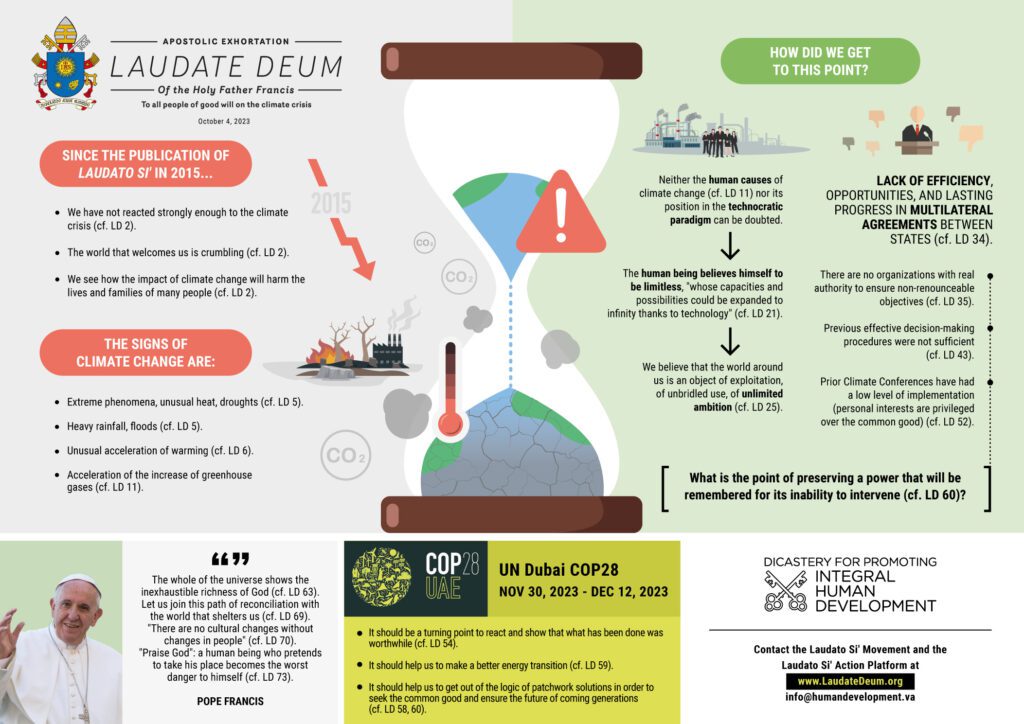By Dean Dettloff, Research and Advocacy Officer
Today, on the feast of St. Francis of Assisi and the opening of the Synod on Synodality, Pope Francis released a new apostolic exhortation entitled Laudate Deum, or “Praise God,” a follow-up to his landmark 2015 encyclical on the environment, Laudato Si’.
Both frustrated and hopeful, Pope Francis writes in Laudate Deum that “with the passage of time, I have realized that our responses have not been adequate, while the world in which we live is collapsing and may be nearing the breaking point.”2 Development and Peace ― Caritas Canada welcomes the pope’s challenging words, urging us once again to answer the cry of the Earth and the cry of the poor.


Damage and causes
“Some effects of the climate crisis are already irreversible, at least for several hundred years,”15 writes Pope Francis, adding that “we are now unable to halt the enormous damage we have caused. We barely have time to prevent even more tragic damage.”16
Humans are the origin of our accelerated climate change, says Pope Francis, although the responsibility is not equally shared. The pope chastises world leaders who have been slow and even resistant in making the kinds of significant transformations that must be made to ensure a future fit for human life. Poor people and nations are sometimes wrongly blamed or criticized despite contributing very little to greenhouse gas emissions, especially compared to per capita emissions in wealthy nations.
“Regrettably,” the pope writes, “the climate crisis is not exactly a matter that interests the great economic powers, whose concern is with the greatest profit possible at minimal cost and in the shortest amount of time.”13
Creating hope
Laudate Deum presents a sober and stark picture of what is happening to our common home. Yet Pope Francis remains hopeful. “To say that there is nothing to hope for would be suicidal, for it would mean exposing all humanity, especially the poorest, to the worst impacts of climate change,”53 he writes.
Pope Francis therefore encourages international bodies to engage in a deeper multilateral means of making binding decisions with real consequences. Aware of the failure of these bodies to do so in the last eight years, Francis also highlights the importance of civil society actors. “The demands that rise up from below throughout the world, where activists from very different countries help and support one another, can end up pressuring the sources of power.”38
As the Catholic movement for international solidarity in Canada, Development and Peace ― Caritas Canada has a unique role to play in amplifying and connecting these demands from below.
Looking to COP28
For his part, Pope Francis has applied pressure of his own on those in places of power. In December, world leaders will gather in Dubai for the 28th Conference of Parties discussing climate change. “If there is sincere interest in making COP28 a historic event that honours and ennobles us as human beings, then one can only hope for binding forms of energy transition that meet three conditions: that they be efficient, obligatory and readily monitored. This, in order to achieve the beginning of a new process marked by three requirements: that it be drastic, intense and count on the commitment of all.”59
Laudate Deum has issued a challenge to world leaders, and to all of us, to build a world of environmental solidarity. As members of Development and Peace ― Caritas Canada, working with our partners, we are determined to meet it.

